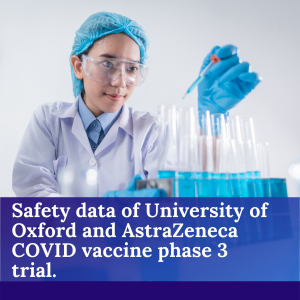Today University of Oxford and AstraZeneca researchers present a pooled analysis of Phase 3 trials of a vaccine against SARS-CoV-2 across two different dose regimens, resulting in an average efficacy of 70.4%. The new study published in the Lancet is the first peer-reviewed publication of phase 3 data from studies of a vaccine against the coronavirus.
Key points on efficacy and safety from article:
- The pooled analysis in the study shows that the overall vaccine efficacy at least 14 days after the second dose was 70.4%; the standard dose / standard dose sub-groups showing 62.1% efficacy, and with the low dose / standard dose sub-group demonstrating 90.0% efficacy.
- No hospitalisations or severe disease observed in the vaccinated groups from three weeks after first dose.
- 175 severe adverse events occurred in 168 participants, 84 events in the ChAdOx1 nCoV-19 group and 91 in the control group. Three events were classified as possibly related to a vaccine: one in the ChAdOx1 nCoV-19 group, one in the control group, and one in a participant who remains masked to group allocation.
Safety profile:
- A case of haemolytic anaemia in the control group in the UK phase 1/2 study occurring 10 days after Meningococcal vaccine was considered possibly related to the intervention and has been previously described.
- A case of transverse myelitis was reported 14 days after ChAdOx1 nCoV-19 booster vaccination as being possibly related to vaccination, with the independent neurological committee considering the most likely diagnosis to be of an idiopathic, short segment, spinal cord demyelination.
- A potentially vaccine-related serious adverse event was reported 2 days after vaccination in South Africa in an individual who recorded fever higher than 40°C, but who recovered rapidly without an alternative diagnosis and was not admitted to hospital. The participant remains masked to group allocation, continues in the trial, and received a second dose of the allocated vaccine without a similar reaction.
- There were two additional cases of transverse myelitis that were originally reported as potentially related but later determined to be unlikely to be related to vaccination by an independent committee of neurological experts.
- One case that occurred 10 days after a first vaccination with ChAdOx1 nCoV-19 was initially assessed as possibly related, but later considered unlikely to be related by the site investigator when further investigation revealed pre-existing, but previously unrecognised, multiple sclerosis.
- The second case was reported 68 days after Meningococcal vaccination. While considered possibly related by the site investigator at the time of reporting, an independent panel of neurological experts considered this to be unlikely.
- All trial participants have recovered, or are in a stable or improving condition.
- There were four non-COVID-19 deaths reported across the studies (three in the control arm and one in the ChAdOx1 nCoV-19 arm) that were all considered unrelated to the vaccine, with cause of death assessed as road traffic accident, blunt force trauma, homicide, and fungal pneumonia.
Link for full article:
https://www.thelancet.com/lancet/article/s0140-6736(20)32661-1

Leave a Reply